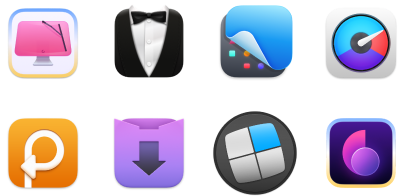M3 MacBook Air vs. M2 MacBook Air — who wins the battle?
- Choose M2 if your work is every day and budget matters.
The MacBook Air M2 easily handles studying, office work, browsing, streaming, and light creative tasks. If you don’t need extra GPU power or multiple external displays, it offers the best value for money. - Choose M3 if performance, graphics, or future-proofing matter.
The MacBook Air M3 delivers noticeably faster CPU and GPU performance thanks to its 3nm chip, better AI capabilities, Wi-Fi 6E, and support for two external displays. It’s the better option for designers, video editors, and power users. - Don’t underestimate GPU and display support differences.
M3’s upgraded GPU and dual external display support make a real difference for graphics-heavy work, multitasking, and professional setups. M2 is limited to one external monitor. - Battery life is similar — efficiency is not.
Both models last up to 18 hours, but M3 runs more efficiently under load. If you frequently push your Mac with demanding apps, the M3 stays faster for longer without throttling. - Get more out of either Mac with the right tools.
Whether you choose M2 or M3, apps like App Tamer, CleanMyMac, iStat Menus, Endurance, and Novabench help optimize performance, extend battery life, and monitor system health. You can access all of them on Setapp under a single subscription. Try Setapp free for 7 days.
Last month, one of my BFFs, who calls me an iSheep, called me and asked, “Hey, I'm planning to buy a Mac Air. But I’m so confused between M2 and M3. Everyone is saying to buy an M3 because it’s the latest model, but what do you think?”
Based on her preferences, I recommended the M2 model, and today, she’s happy with her purchase.
But that’s not the answer for everyone.
I’ve seen many people saying there is almost no difference between M2 and M3, but that small difference is noticeable enough to consider when choosing between the two models. The M3 model has noticeable upgrades in terms of performance, features, and capabilities, thanks to Apple’s new 3nm chip technology.
So, it’s worth taking time to understand the difference between M3 MacBook Air vs. M2 MacBook Air. After all, buying a Mac is a big investment, and you can’t go wrong with it.
Overview of MacBook Air M2 and MacBook Air M3
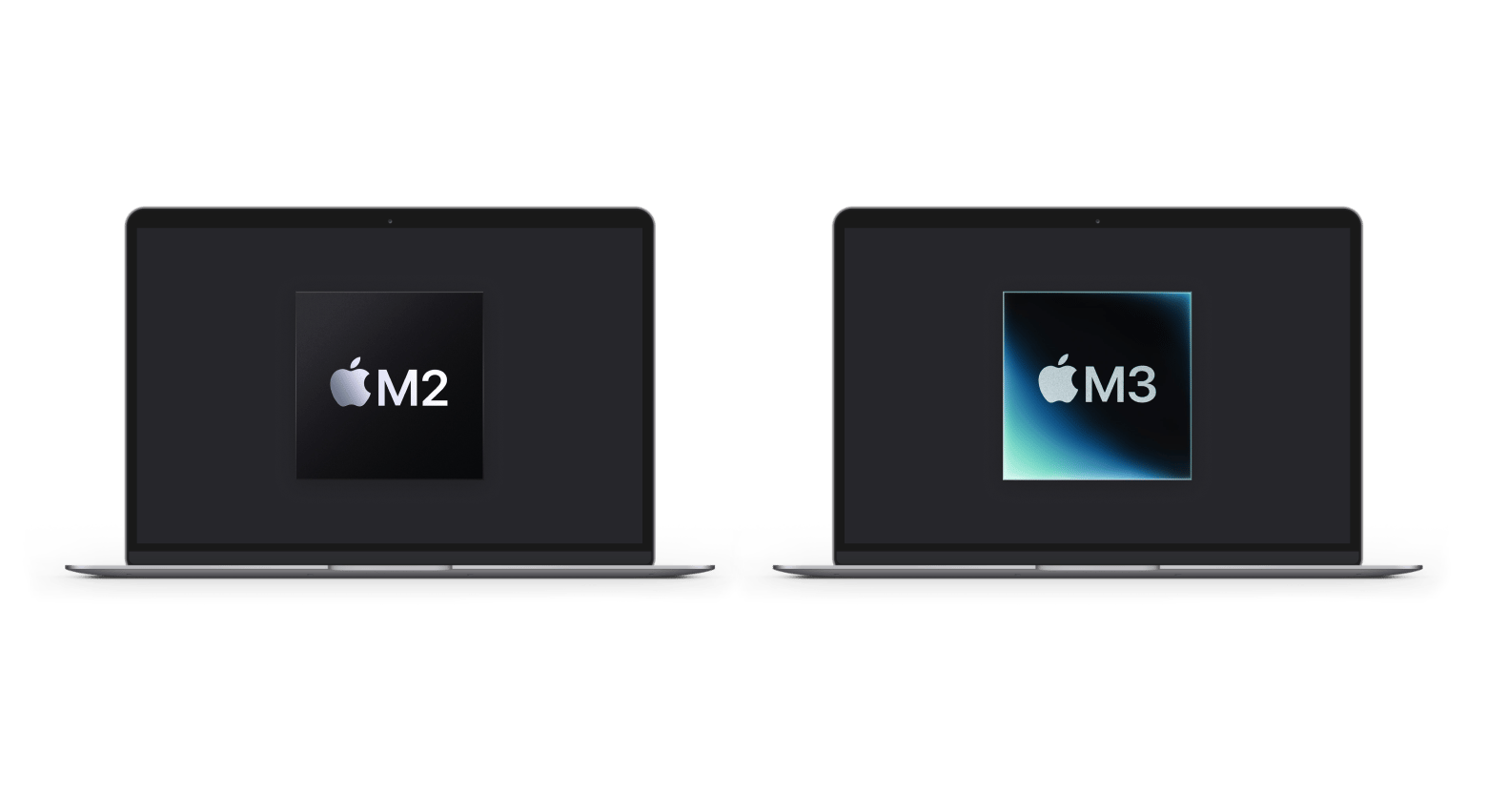
Apple announced its second-generation processor, called M2, in June 2022 with improved performance compared to the previous M1 processor. In July 2022, Apple released the 13-inch version of the MacBook Air M2 and the 15-inch version in June 2023. Mac Air M2 is 18% more powerful than its M1 version. The M2 supports much better graphics capabilities and up to 24GB of RAM than the MacBook Air M1, which maxes out at 16GB. Besides, M2 received many major upgrades, making it better than M1.
Then, in March 2024, came the MacBook Air M3, which had even better performance, higher efficiency, and more advanced features than its predecessor. Available in 13.6—and 15.3-inch display sizes, M3 is built on Apple’s 3nm process, delivering faster speed, enhancing graphics-intensive apps' capabilities, and improving energy efficiency.
Specs and configurations: MacBook Air M3 vs MacBook Air M2
Here’s a side-by-side look at the main differences you should know:
| Let’s compare M2 vs M3 MacBook | MacBook Air M3 | MacBook Air M2 |
| Display size | 13-inch and 15-inch | 13-inch |
| CPU and GPU | 8-core CPU and 10-core GPU | 8-core CPU and 8-core GPU |
| Unified memory | 16GB unified memory standard (configurable to 24GB) | 16GB unified memory (configurable to 24GB) |
| Storage | 256GB SSD configurable to 512GB, 1TB, or 2TB | 256GB SSD configurable to 512GB, 1TB, or 2TB |
| Battery | Up to 18 hours | Up to 18 hours |
| Camera | 1080p FaceTime HD camera | 1080p FaceTime HD camera |
| Ports | 2x Thunderbolt / USB 4, MagSafe 3 charging port, 3.5mm headphone jack | 2x Thunderbolt / USB 4, MagSafe 3 charging port, 3.5mm headphone jack |
| Wireless | Wi-Fi 6E, Bluetooth 5.3 | Wi-Fi 6, Bluetooth 5.0 |
| Touch | No | No |
| Price | Starting at $1,099 (subject to change) | Starting at $999 (subject to change) |
Tip: If you're trying to decide between M3 and M2 MacBook Air but aren't sure which model you currently have, the Apple Serial Lookup & IMEI Checker assistant can help verify your MacBook's exact specs before upgrading.
As you can see, both models share a similar design, battery life, display quality, and port configurations. But I believe performance is the topmost priority for many (including me). This is where the big difference comes in between M2 and M3.
Here, I’d like to recommend my favorite tool, Novabench. It’s a fantastic benchmarking tool that lets you test the main components of your Mac within just minutes. You can test the CPU, GPU, RAM, and disk speed of your Mac in different conditions, giving you a complete performance overview of your device. Plus, using the app’s Stress Test feature, you can test your Mac’s RAM, GPU, and CPU under heavy load to ensure stability and performance, no matter what M-chip Mac you have.
Here is how to use Novabench:
- Install and open the app.
- Click Start All Benchmark Tests.
- Wait for the results.

Now, you’ll get a Novabench score for Mac’s overall performance, along with specific scores for CPU, GPU, memory, and Apple SSD. You’ll also see a graph for CPU and GPU temperatures, power, and load.
Read also: MacBook generations in order
What's the main difference between MacBook Air M2 and MacBook Air M3?
As you can see, the MacBook Air M3 debuted with some notable improvements over the M2 model:
- Processor performance: The M3 chip is built on a 3nm process, which offers improved performance and energy efficiency over the M2 chip, which uses a 5nm process.
- GPU capabilities: The M3 has a new GPU architecture that makes M3 15% better graphic performance than M2.
- Wireless connectivity: The M3 model supports Wi-Fi 6E, providing faster and more reliable wireless connections, whereas the M2 uses Wi-Fi 6.
- External Display Support: The M2 MacBook Air supports only one external display, while the M3 model can handle two external displays.
Want to go further and discover everything about M-series chips? Check out the article on the differences between M1 and M2 chips.
Who should buy the MacBook Air M2?
The MacBook Air M2 is suitable for the following audiences:
- Students who use their laptops for note-taking, web browsing, and video meetings.
- Casual users who use their laptops for emails, web browsing, streaming, and office apps.
- Creative professionals involved in basic photo editing, video editing, or graphic design.
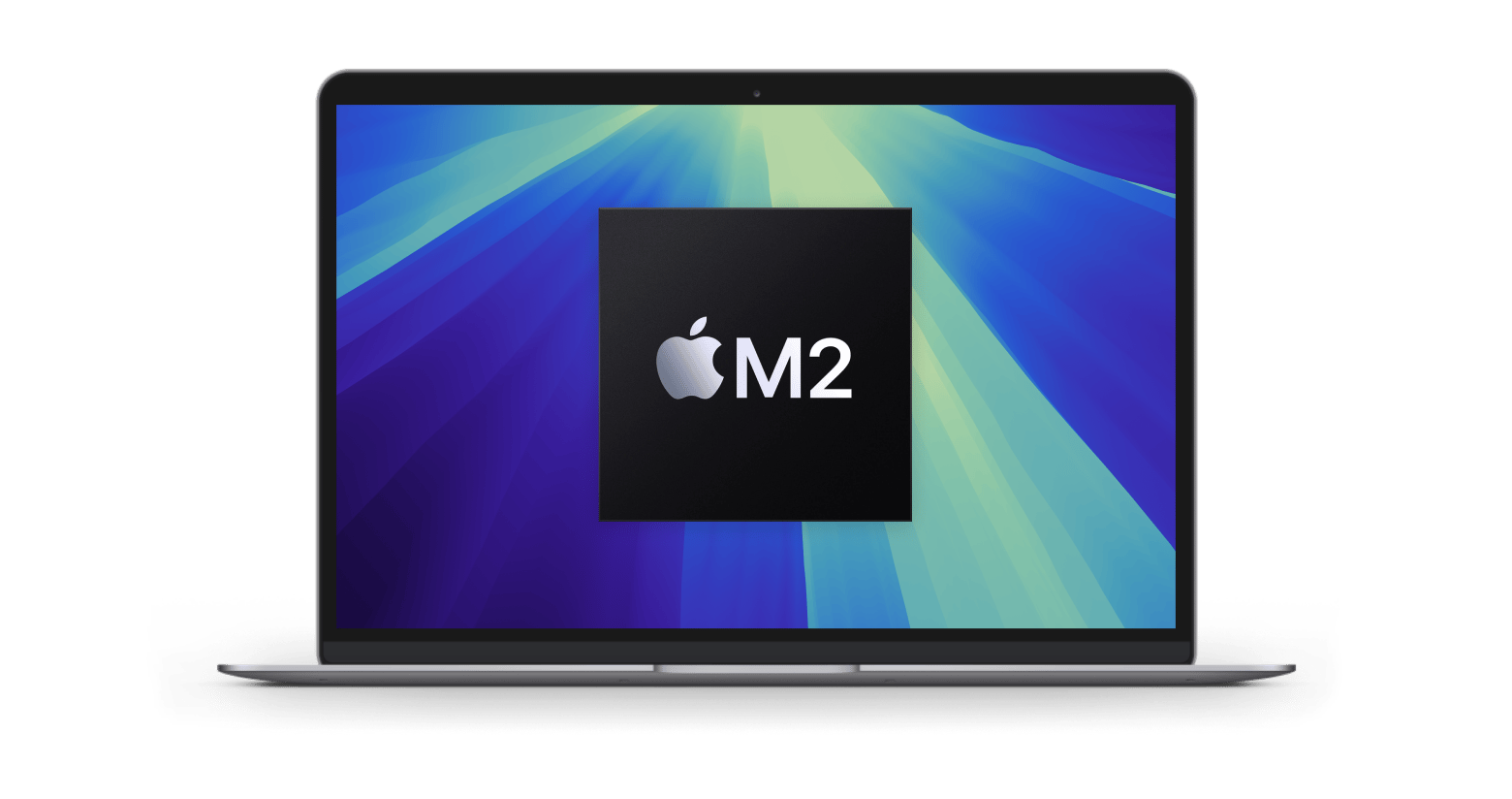
Who should buy the MacBook Air M3?
On the contrary, the MacBook Air M3 is suitable for the following audiences:
- Power users and professionals who need excellent performance for demanding tasks and apps.
- Buyers who want a future-proof MacBook with the latest components.
- Graphic designers engaged in high-resolution photo-editing, video creators, and alike.
- For professionals who need multiple monitors because M3 supports up to two external displays.
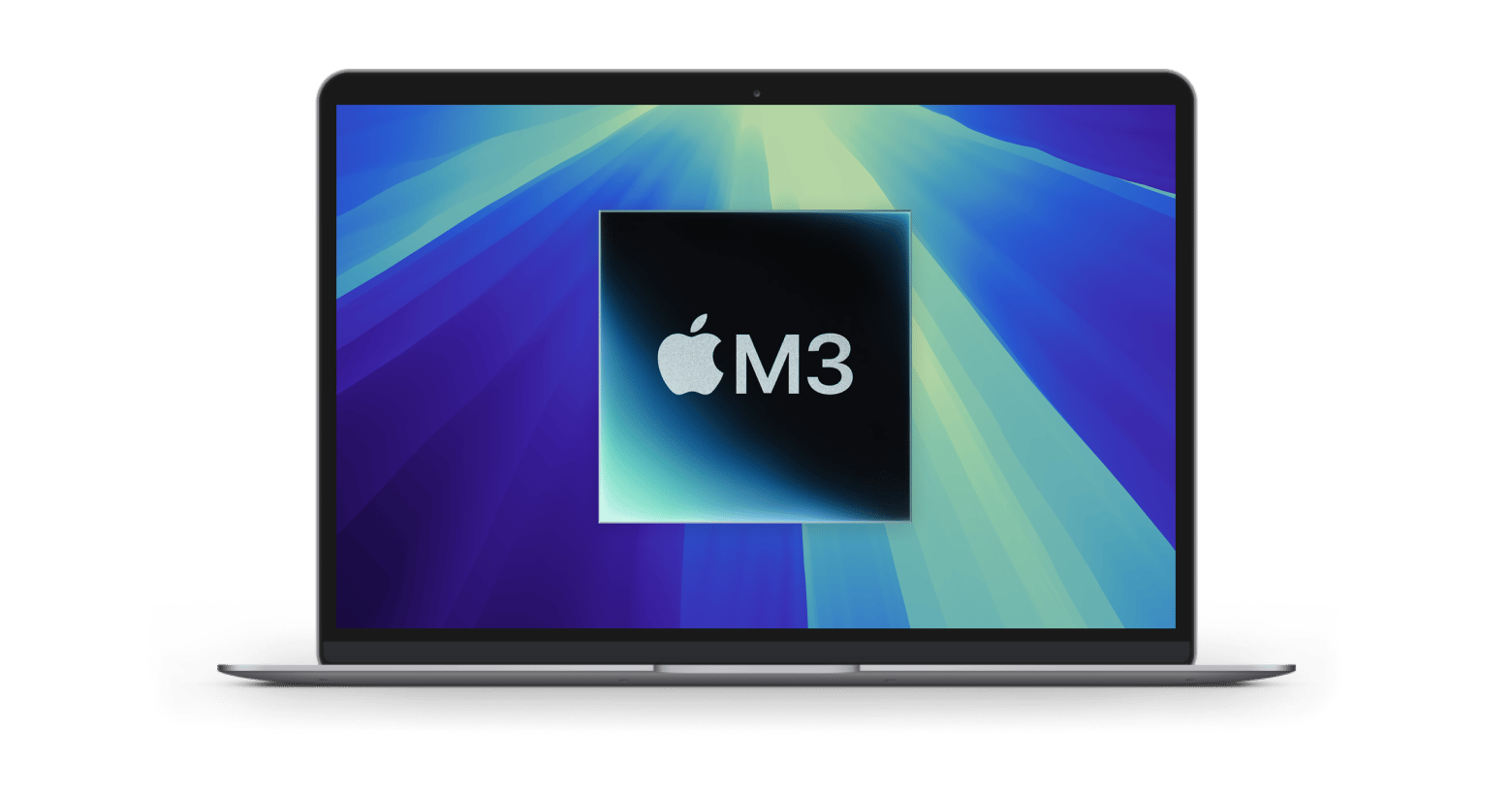
MacBook Air M2 vs MacBook Air M3 comparison
Now, let’s compare both MacBook Air M2 and MacBook Air M3 for key specs like processor, storage, display quality, compatibility, design, and price.
Let’s begin.
Processor and performance comparison
The biggest upgrade in M3 is the switch to a 3nm process, which makes it 19% faster in single-core performance and 20% faster in multi-core performance. So, if you’re like me and can compromise performance for nothing, go for the Mac Air M3 for significantly faster productivity performance.
Similarly, the M3 GPU is 76% faster than the M2 GPU, thanks to the new Dynamic Cashing memory system, built-in hardware mesh shading, and hardware-accelerated ray tracing. So, I’m sure M3 will impress you if you’re into gaming, 3D rendering, and graphics-intensive tasks.
Plus, although both chips have a 16-core Neural Engine, the M3 Neutral Engine is faster, making it more suitable for machine learning and AI-related tasks.
You can even control or customize CPU usage for specific apps using App Tamer. Here’s how to do this:
- Install and open App Tamer.
- Type the app name in the search bar.
- Click on the app under HIGHEST CPU PROCESSES.
- Choose the option you want to control the app’s CPU usage. That’s it.
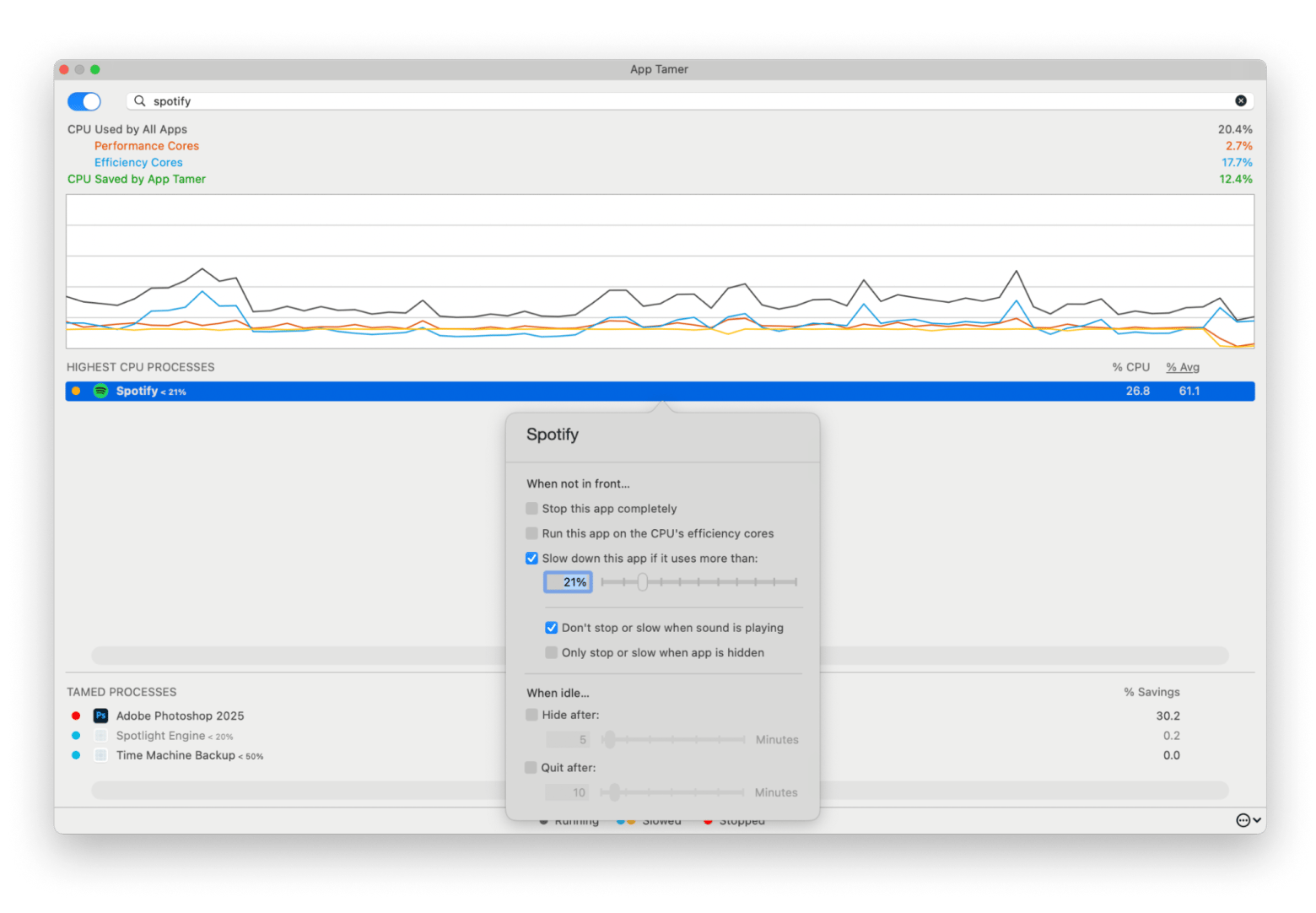
Battery life comparison of M2 and M3 models
In video playback tests, the M2 model shows around 16 hours during continuous video loops, while the M3 model reaches roughly 18 hours in similar conditions. In practice, the difference feels modest — both machines comfortably last a full workday with a mix of web browsing, video calls, streaming, and light creative work, though the M3 tends to hold on a bit longer under heavier multitasking. Officially, Apple M2 vs M3 performance rates both Macs for up to 15 hours of web browsing and up to 18 hours of video playback.
Here is how it works:
- Install and open Endurance.
- Click the Endurance icon in the menu bar > Open Endurance Preferences.
- Select the options you want to save the Mac battery.
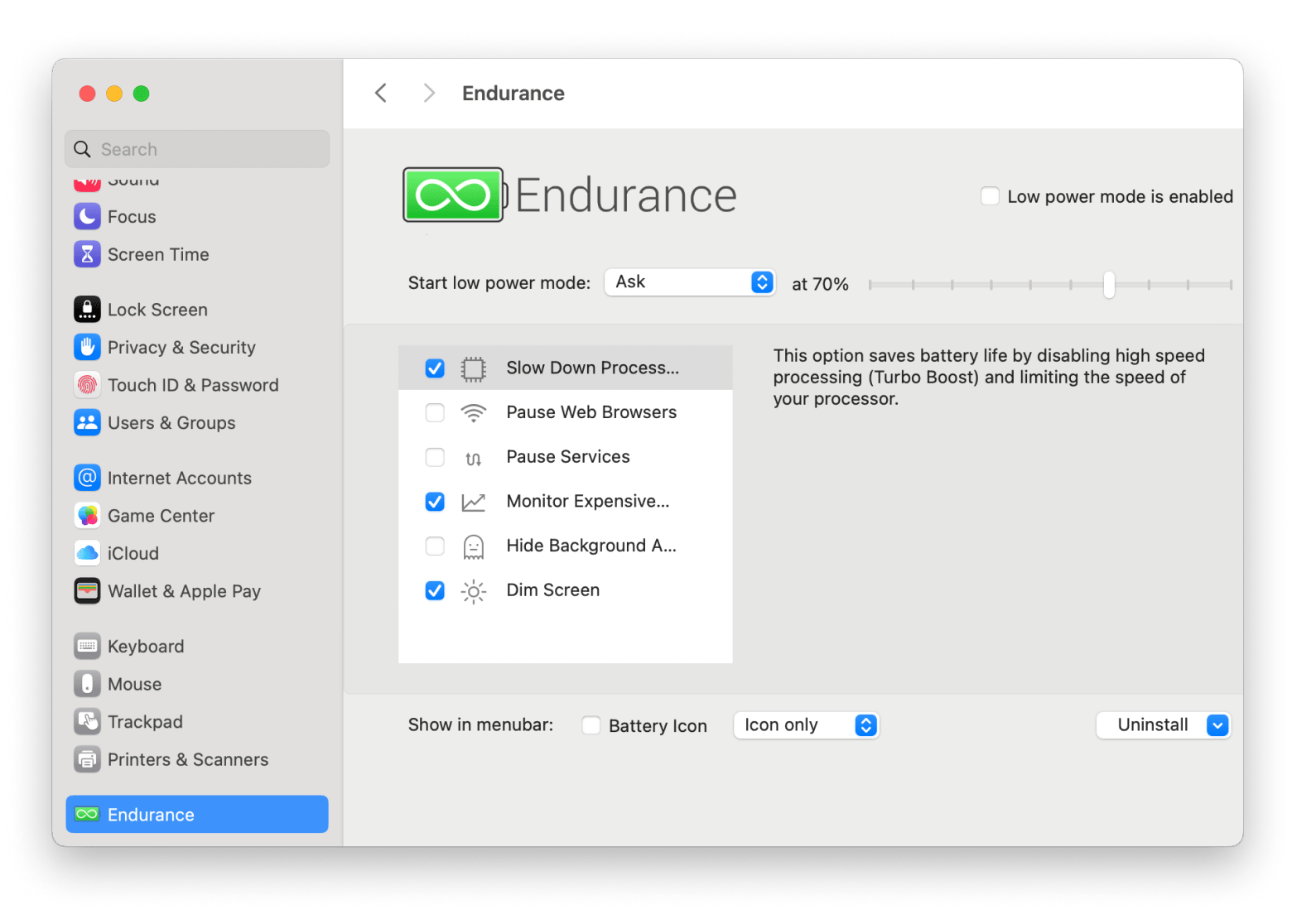
RAM and storage options
Both M2 and M3 MacBook Air base models now come with 16GB of RAM as standard, following Apple’s 2024 update. Storage starts at 256GB SSD, and both the 13-inch and 15-inch models can be configured with up to 24GB of RAM and 2TB of storage for users who need more power.
MacBook Air M2 vs MacBook Air M3: Display quality and size
Both laptops have the same flat, utilitarian design and share identical display specifications:
- Screen resolution: 2560 x 1664 pixels (Except 15.3-inch MacBook Air M3)
- Brightness: 500 nits
- Color Support: Wide Color (P3) and True Tone technology
- Refresh Rate: 60 Hz
One important change to the MacBook Air M3 is its 15-inch version, which has a larger display with a screen resolution of 2880 x 1864 pixels. So, you can expect the same consistent color accuracy across models.
Thermal efficiency and cooling system
Both laptops feature a fanless architecture. So, they use passive cooling, letting the natural flow of air while some heatsinks and chassis keep the CPU from getting too hot. The fanless design offers silent operation but may result in higher surface temperature during prolonged use and high-performance tasks.
When it comes to thermal efficiency, M2 may become warm and cause thermal throttling during prolonged high-performance tasks. The M3 model, on the other hand, uses an advanced 3nm process that improves energy efficiency and performance. But, a stress test shows that M3 can reach 114 degrees Celsius on its hottest core. Despite this, the M3 can maintain performance without immediate thermal throttling. But higher temperatures certainly affect the performance.
Well, that’s not all. There is another ultimate app — iStat Menus — that provides at-a-glance details about the inner workings of your Mac, from the load on the CPU and memory usage to the health of your Wi-Fi connection. You can access all these details by clicking little icons at the top of the screen in your menu bar.
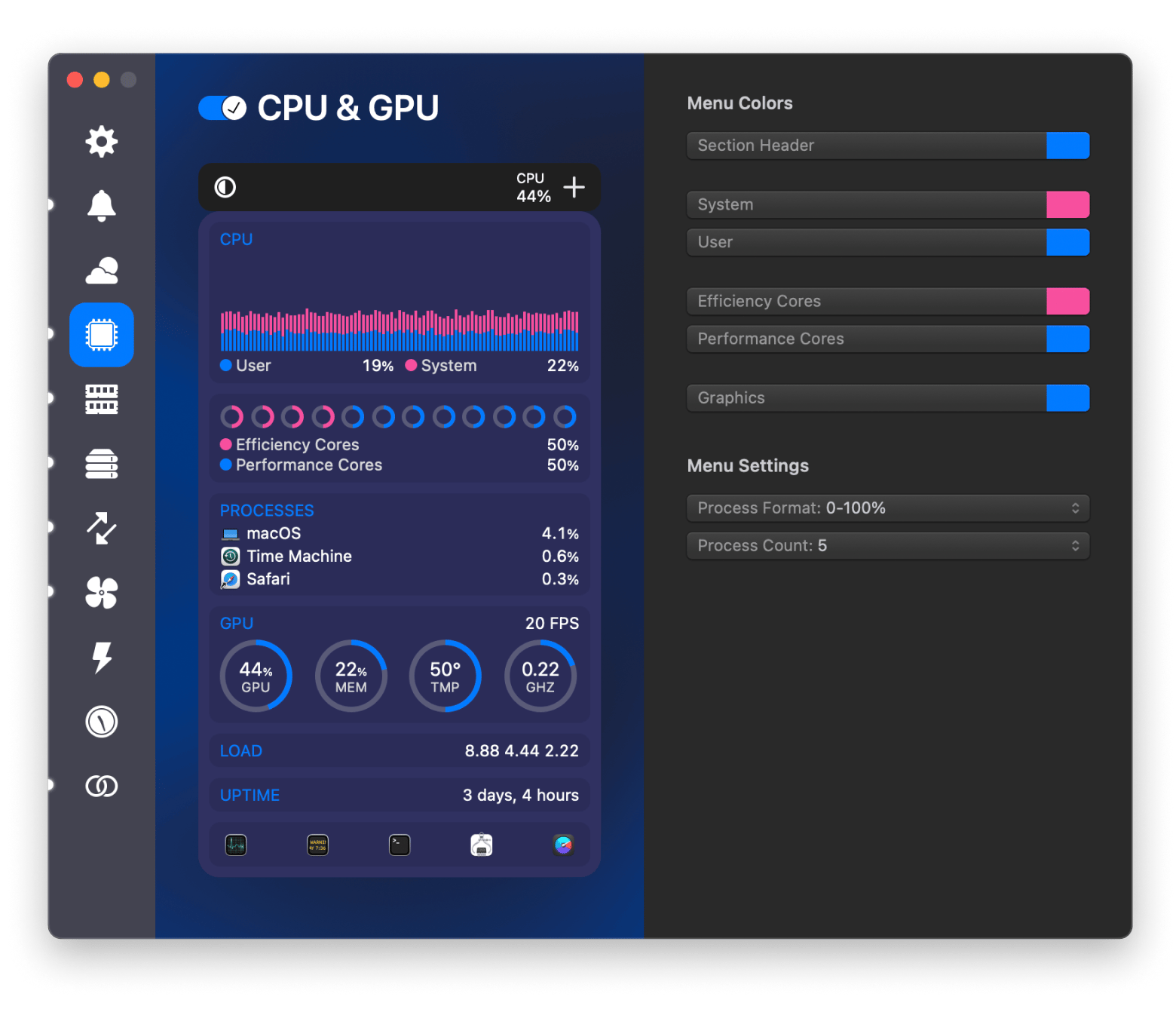
You’ll see graphs and statistics showing real-time CPU and GPU usage by system and user. Expand CPU sections to know which processes are consuming the most CPU power. By clicking on the other options of the sidebar, you can check memory, disk, temperature, and battery to check the complete performance of the Mac.
macOS compatibility: What to expect
All versions of M2 and M3 laptops are compatible with macOS 14 Sonoma and can be upgraded to the latest macOS 15 Sequoia.
One of the most noticeable things about macOS Sequoia is the maximized use of Apple Intelligence. The M2 chip supports AI features, but it's not as robust as the M3 when it comes to AI processing capabilities.
Otherwise, both models can efficiently handle other features of macOS Sequoia, including:
- iPhone mirroring: Control your iPhone via Mac.
- Window tiling: Drag windows to the left or right of your screen to better organize open apps.
- Passwords app: A new end-to-end encrypted Passwords app to store your Wi-Fi passwords, security codes, and passkeys in one place.
Other features include an improved gaming mode, new videoconference tools, upgraded Notes app, and updates to Safari.
MacBook Air M2 vs MacBook Air M3: Design and build quality comparison
Here, the difference is negligible, or I’d say both M3 Air and M2 Air look almost the same. Let’s discover how.
Exterior design and materials
- Design: Both models share the same ultra-thin, wedge-less design with curved corners and a flat, minimalist chassis that make these Macs visually appealing and ergonomic.
- Material: The enclosure of both models is made of 100% recycled aluminum with a premium, polished finish.
- Colors: Midnight blue, starlight, silver, and space grey.
Portability and weight differences
The 13-inch models are both 0.44 inches thick and weigh 2.7 pounds. The 15-inch models are 0.44 inches thick and weigh 3.3 pounds, slightly heavier due to the larger display.
Cost comparison for MacBook Air M2 vs. M3 models
The M2 MacBook Air is available at $999 for the 13-inch model. The M3 MacBook Air 13-inch is $1,099, and the 15-inch version is $1,299.
Pros and cons summary table
What will be the best option? Let’s once again compare the features of the MacBooks:
| What’s the better option? | M3 MacBook Air | M2 MacBook Air |
| Performance | Faster and more efficient thanks to the M3 chip | Features M2 chip, still suitable for most everyday tasks |
| Display support | Supports up to 2 external displays with closed lid | Supports only 1 external display |
| Wi-Fi | Wi-Fi 6E for faster wireless connectivity | Wi-Fi 6 (slightly slower) |
| Standard RAM | Available with 16GB as standard | 8GB standard upgradable RAM |
| Graphics | Improved GPU performance for graphics-intensive tasks | Decent GPU performance but less powerful than M3 |
| Energy Efficiency | More power-efficient, longer battery life | Efficient but less so than the M3 |
| Features | Incremental updates; many features (like RAM/storage upgrades) are identical to M2 | Fewer advanced features compared to M3 (e.g., external display support, Wi-Fi 6E) |
| Value | Higher prices may not be justified for users with basic computing needs | Offers excellent value for budget-conscious users |
MacBook Air M2 vs M3: The verdict
To sum up, the MacBook Air M2 and MacBook Air M3 are almost identical, except that, being the latest model, the M3 has some notable improvements, like faster performance, excellent AI capabilities, and highly improved GPU functioning. I suggest identifying your requirements and preferences and choosing a laptop that best suits your needs.
Also, the apps mentioned are truly very useful when it comes to managing my Mac’s performance:
- App Tamer identifies and stops CPU-hogging apps so that you can use the resource for important tasks.
- CleanMyMac is an all-in-one Mac care app that allows you to run performance optimization, free up space, and manage apps smoothly.
- iStat Menus collects and displays key stats about your Mac, from CPU load and disk usage to memory load, fan sensors, battery life cycles, and many more.
- Endurance helps make your laptop battery last longer by up to 20%.
- Novabench provides detailed metrics about the capabilities and limitations of your MacBook.
The best thing is you can access all these apps under one subscription with Setapp. Take the free 7-day try, subscribe, and access 250+ powerful apps for your MacBook.
FAQs: MacBook M2 vs. M3
Is a MacBook M2 better than an M3?
In terms of performance, energy efficiency, AI applications, and graphics capability, the M3 is undoubtedly better than the M2.
What is the difference between the M2 and M3 MacBook Air?
- The M3 MacBook Air uses 3nm technology, delivering better performance and energy efficiency, while the M2 relies on the older 5nm process.
- The M3 features an advanced GPU with Dynamic Caching, hardware-accelerated ray tracing, and mesh shading for superior graphics.
- The M3 supports two external monitors through its USB-C ports, while the M2 can only handle one external monitor.
Should I upgrade from M2 to M3?
Upgrading from M2 to M3 depends on your needs. The M2 is sufficient for everyday tasks, but the M3 is ideal for graphic-intensive work, such as video editing and 3D rendering, or if you need access to advanced AI features.
How much better is M3 compared to M2?
The M3 offers significant improvements over the M2, including:
- Enhanced CPU and GPU performance with its 3nm process.
- Better energy efficiency, extending battery life.
- Improved AI capabilities for machine learning and automation tasks.
Is the M3 MacBook Air the same size as the M2 MacBook Air?
Yes, the M3 and M2 MacBook Air models share the same size and dimensions. However, the M3 Air is available in both 13-inch and 15-inch variants, whereas the M2 Air is only available in the 13-inch size.
